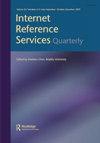Leveraging AI Technologies in Libraries through Experimentation-Driven Frameworks
Q3 Social Sciences
引用次数: 5
Abstract
Abstract This column aims to explore the frameworks to help libraries foster digital innovation by leveraging AI technologies through continuous experimentation to innovate their services for their patrons. Additionally, the column seeks to highlight the benefits and interplay between the frameworks, providing insights for librarians interested in implementing AI solutions and driving technological advancements in library settings. The column reports two frameworks - The Need-Based Experimentation (NBE) Framework and the Curiosity-Based Experimentation (CBE) Framework based on the author’s professional experiences and empirical observations of 10 university libraries’ experimentation-driven AI technology adoption practices. The NBE framework focuses on experimenting with AI technologies that have the functional capability to address the library’s current business needs. In contrast, the CBE framework explores AI technologies out of curiosity, aiming to gain practical experiences and uncover potential future applications, aligned with the librarian’s interests. These frameworks guide librarians to effectively experiment with AI technology based on their motivations and goals. To the best of the authors’ knowledge, there is no experimentation-driven framework for adopting AI technologies to assist libraries do so strategically. The adoption of AI should be influenced by carefully planned, ongoing experiments, the results of which should be deployed in real to inform adoption decisions.通过实验驱动的框架在图书馆中利用人工智能技术
本文章由计算机程序翻译,如有差异,请以英文原文为准。
求助全文
约1分钟内获得全文
求助全文
来源期刊

Internet Reference Services Quarterly
Social Sciences-Library and Information Sciences
CiteScore
2.40
自引率
0.00%
发文量
13
期刊介绍:
Internet Reference Services Quarterly tackles the tough job of keeping librarians up to date with the latest developments in Internet referencing and librarianship. This peer-reviewed quarterly journal is designed to function as a comprehensive information source librarians can turn to and count on for keeping up-to-date on emerging technological innovations, while emphasizing theoretical, research, and practical applications of Internet-related information services, sources, and resources. Librarians from any size or type of library in any discipline get the knowledge needed on how to best improve service through one of the most powerful reference tools available on the Internet.
 求助内容:
求助内容: 应助结果提醒方式:
应助结果提醒方式:


